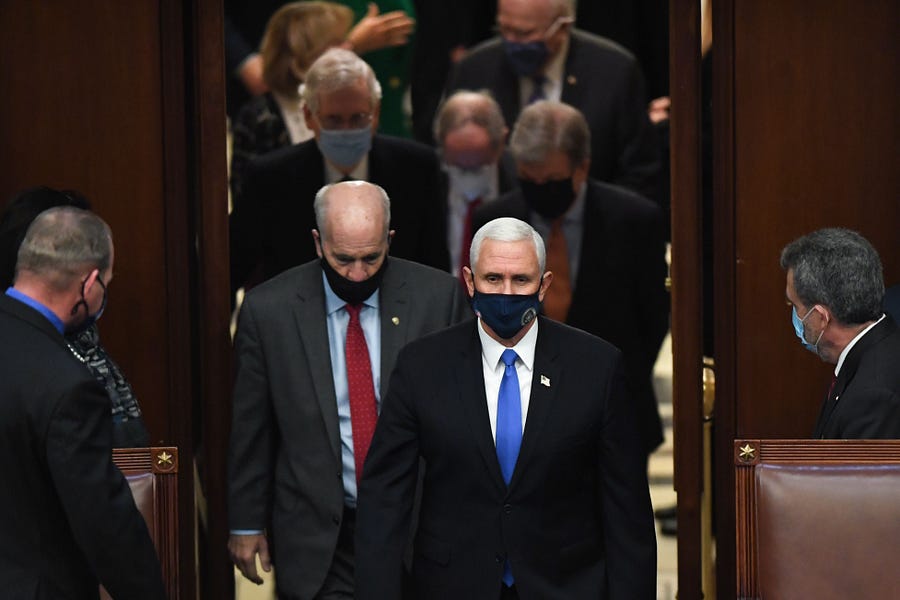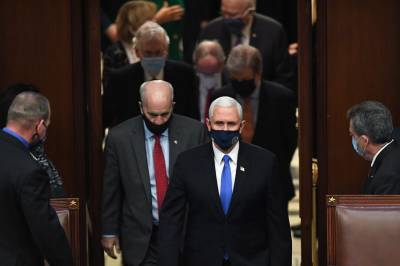Any person of integrity who works in or around politics and government, becomes immediately aware of an inherent tension. This tension is between what they think is right, and what their job requires of them. This tension will inevitably occur repeatedly throughout a life in politics, and a prudent practitioner knows their battles must be picked carefully, as a failure to pick the right battles will earn you a quick exit from any position of influence. This is true from high-level Cabinet officials down to the lowest congressional staffer.
Nobody is more aware of this fact than former Vice President Mike Pence.
As the Trump era ends, I think it important to discuss the position Pence was in, and the wider issue that many Trump appointees faced.
I believe Pence’s letter of January 6 in which he declared that he did not have the authority to unilaterally reject the electoral votes of any state (and, according to the Donald Trump’s bizarre and unsupportable theory, handing him the election in spite of a clear loss), will eventually earn him a place in history as a dignified statesman and a patriot. Trump’s self-serving interpretation of the Constitution was a threat to the very foundation of our republic and had Pence went along with this charade, the damage to America would have been incalculable. But he didn’t.
In this way, he performed what I consider the ultimate realization of something I’ve been calling, if you can indulge me in a Harry Potter analogy, the “Snape Option.”
Severus Snape, for those unfamiliar with the series, was a mercurial figure who spent years in service of the story’s main villain, the evil wizard Voldemort. Ultimately, it was revealed that, while he started out sympathizing with Voldemort, he quickly became disillusioned. Yet, he stayed on as one of Voldemort’s followers for years. He did this to gain influence and minimize the damage that Voldemort could do to the story’s main hero, Harry Potter, and to Potter’s compatriots. He was ultimately successful in protecting Potter and most of his friends, but it cost him his life.
I am a lifelong Republican who believed Trump to be a danger, both to my party and my country, and quite vocally refused to support him, twice. But nonetheless, for years, I’ve been encouraging friends to execute the “Snape Option,” i.e., if you feel so called, accept a job in the Trump administration in order to make the best of a difficult situation.
But back to Pence for now. With the exception of a handful of Trump dead-enders, who still gauge things only in relation to whether it comports with the former president’s wishes, Pence’s rejection of Trump’s unconstitutional demand has received wide bipartisan support. However, as I’ve shared the opinion that Pence’s actions deserve not just backing, but significant praise, I’ve been rebuffed by many on the left and the anti-Trump right, who claim his actions are too little too late, often listing myriad real and imagined grievances.
They view his good actions as piddling, insincere, or, at minimum, insufficient to make up for past sins, up to and including accepting the vice presidential nomination in the first place.
On some level, I am sympathetic. I believe the insurrection of January 6, which threatened Pence’s life, completely vindicated my Trump-skepticism. Some erstwhile Trump supporters agree with me. Further still, there were many instances in the last four years where Pence took actions I considered insincere and repelling.
Yet, I cannot help but ask the question, “And then what?” Pence could have “told the truth” as his critics might say it, many times during the administration. But to what end?He’d have become an irrelevant in the administration, and been unable to meaningfully influence much of anything.
As such, I cannot help but think that Pence’s harsher critics demonstrate a lack of appreciation of what it really means to act with integrity when it comes to accepting virtually any supporting role in politics. The Trump administration, more than most, has forced its subordinates to confront this issue.
When making the decision to accept any such position, nobody’s motives are pure. Anyone who is in a position to be offered a job in politics will have self-interested reasons, (career, ego, etc.) to accept. Most probably have legitimate grievances with the “other side,” as well. Yet at the same time, particularly with a situation Republicans faced with Trump, the motivation to get the best possible outcome in a bad situation cannot be ignored. There was openly this kind of talk when Trump got the Republican nomination in 2016, and most discussing these kinds of things saw Pence as an “adult in the room” that could be trusted to fight against Trump’s worst impulses.
Indeed, this larger dilemma was publicly shared by men like John Bolton, who saw his record as Trump’s national security adviser: “(M)ore a record of damage control, than of accomplishment.” Bolton’s view was shared privately by hundreds of other political appointees whose names would mean nothing to the public, but who make up a lot of the people you might meet at church on Sunday in Washington.
There is no way to deny that taking any such role requires compromises. Some of which the individual may not wish to make.
Yet at the same time, Bolton’s statement points at another question: Who else would have filled these roles? Making what I would consider a safe assumption, that they would have been filled with individuals of less thoughtfulness and integrity, it is worth asking: How much worse would the last four years have been for the country if people like Pence or Bolton hadn’t served?
There are no easy answers to these questions, and I would suggest, ultimately, one person’s answer to these is not decisive in evaluating their actions. What is decisive is how they act when it matters most.
Much like Snape, many of Pence’s actions seemed repugnant. Famed columnist George Will said that Pence “had a talent for toadyism” and mocked him as the “worst person in government.” I think it’s hard to deny that Pence undoubtedly was required to say things he did not believe, and act in ways he would rather have not, in service of the Trump administration.
Yet we must ask: What would have been gained by substituting a lesser man for Pence? One thing is certain: Pence faced enormous political, personal, and ultimately even physical pressure to violate his oath to the Constitution and reject the electoral votes of states Biden won. Complaining that these efforts would have ultimately proven futile is irrelevant. The public damage to the Constitution and our entire system would have been done.
Pence revealed his true colors on January 6. After four years of suffering indignity after indignity, making compromise after compromise, he chose the moment when it mattered most to make a stand for the Constitution and his country, what he has always maintained where his highest values, apart from God. He did this to his own political detriment, undoubtedly mortally wounding himself with Trump’s hardcore fans.
Moreover, as we turn the page on the Trump administration, and you come across someone who served in the Trump administration, criticize their decision to take a job if you must, or the compromises they made if you feel so qualified, but keep in mind the tensions they operated under. There are many who served and executed the “Snape option” in ways big and small.
In my view, they are unsung heroes.






Please note that we at The Dispatch hold ourselves, our work, and our commenters to a higher standard than other places on the internet. We welcome comments that foster genuine debate or discussion—including comments critical of us or our work—but responses that include ad hominem attacks on fellow Dispatch members or are intended to stoke fear and anger may be moderated.
With your membership, you only have the ability to comment on The Morning Dispatch articles. Consider upgrading to join the conversation everywhere.